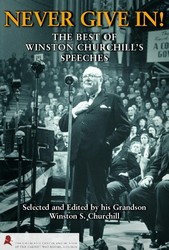Winston Churchill Never Give In
|
| updated |
Copy Link Code
|
 In 1941, most of the world was embroiled in war. Although the start time for World War II varies according to the country being referred to, the war actually began with the German invasion of Poland on September 1, 1939. By December 7, 1941 the United States was finally pulled into the fight, making it an 'official' world war.
In 1941, most of the world was embroiled in war. Although the start time for World War II varies according to the country being referred to, the war actually began with the German invasion of Poland on September 1, 1939. By December 7, 1941 the United States was finally pulled into the fight, making it an 'official' world war.
But, on October 29, 1941, the British Prime Minister – Winston Churchill – found himself back at his alma mater, Harrow School. Having attended the military boarding school as a young man (from 1888-1893) his homecoming to the place he had entered at the age of 14 was very different. In fact, just a year earlier, in 1940, he had returned to the school to hear the old songs of his youth, only to find that a verse had been added to one of them, which included his own name. Sincerely moved by this addition, he specifically mentioned it in his speech, "you sang that extra verse written in my honor, which I was very greatly complimented by and which you have repeated today."
As a man who had fought so valiantly to obtain an education – garnered mostly from his own self-teaching – Churchill was in a great position to offer advice about tenacity. He had just spent the ten months leading up to the commencement address entangled in the insidious web of the rapidly escalating war. Despite traveling thousands of miles all over the world to meet with the leaders of other nations, despite his attempts to negotiate surrender or at the very least a temporary suspension of fighting, nearly every nation of the world was waging battle against another. There were shortages of food, munitions, and oil; there was ongoing disruption in the supply channels for warring nations. Things had steadily increased from concerning, to frightening, to chaos, within the space of a few months. With so many daunting issues plaguing him, it's a small wonder that Churchill was able to deliver the speech. But, as always – and, as his speech would instruct the young men at his alma mater – he was not one to quit.
The most memorable portion of the speech is actually in the middle, which is unique for Churchill, known for his inspiring perorations (speech endings). Regardless, he delivered this speech with the same ferocity, almost as if it were a call to arms:
"You cannot tell from appearances how things will go. Sometimes imagination makes things out far worse than they are; yet without imagination not much can be done. Those people who are imaginative see many more dangers than perhaps exist; certainly many more than will happen; but then they must also pray to be given that extra courage to carry this far-reaching imagination. But for everyone, surely, what we have gone through in this period - I am addressing myself to the School - surely from this period of ten months this is the lesson: never give in, never give in, never, never, never, never - in nothing, great or small, large or petty - never give in except to convictions of honor and good sense. Never yield to force; never yield to the apparently overwhelming might of the enemy."
